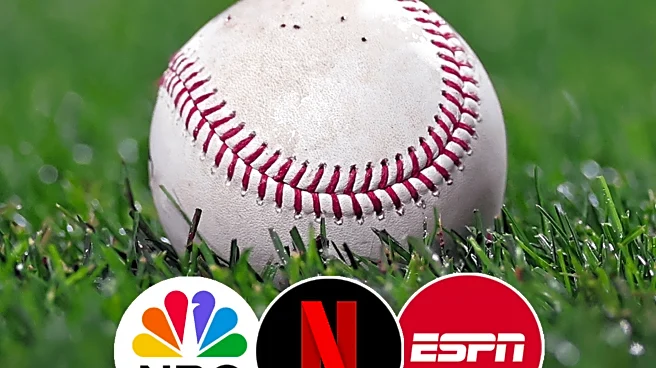Last February, ESPN, which has been carrying Major League Baseball games for 35 years, including its signature Sunday Night Baseball franchise, opted out of the last three years of a deal with MLB in which it was
supposed to pay the league $550 million a year.
The breakup was somewhat acrimonious, with MLB issuing a statement which read in part:
Unfortunately in recent years, we have seen ESPN scale back their baseball coverage and investment in a way that is not consistent with the sport’s appeal or performance on their platform. Given that MLB provides strong viewership, valuable demographics, and the exclusive right to cover unique events like the Home Run Derby, ESPN’s demand to reduce rights fees is simply unacceptable. As a result, we have mutually agreed to terminate our agreement.
The parties have now kissed and made up. On Wednesday the league announced a new partnership with ESPN (as well as deals with NBC and Netflix). Here’s what the league is getting, according to Andrew Marchand in The Athletic:
Sources briefed on the agreements said NBC/Peacock is expected to pay nearly $200 million per year, while Netflix will dole out $50 million per season. MLB will receive almost $750 million per year in total over the next three seasons. If ESPN hadn’t opted out, it would have paid $1.65 billion. NBC’s deal includes some ratings bonus clauses that could make the exact number fluctuate, but will not exceed $200 million, the sources said.
ESPN’s deal will be for a newly created package and will be for the same $1.65 billion over three years.
MLB met with ESPN to make up for lost money in old assets and, in return, will still receive the $1.65 billion over the next three years. To do so, MLB had to relinquish its rights to MLB.TV, which is the league’s out-of-market platform for games. Platforms have coveted MLB.TV for years, but the league has refused to relinquish it until now.
If you’re a bit confused by that, Marchand explains further in another piece:
ESPN planned to pay around $1.65 billion over the next three seasons for “Sunday Night Baseball,” the Home Run Derby and first-round playoff games. Now, NBC/Peacock has picked up “Sunday Night Baseball” and the first-round playoff games for nearly $200M a year, while Netflix took on the Home Run Derby, Opening Day and the “Field of Dreams” game for $50 million per season.
Those two deals add up to nearly $750 million in total over the next three years, which is $900 million less than what ESPN owed before the opt-out. Manfred’s move in the original negotiations is akin to reaching for a 3-0 pitch and fouling out instead of just taking first base and collecting $1.65B.
MLB’s spin is that it is now making similar money, seemingly overlooking that this is the case by auctioning off perhaps its most premier rights of games outside of the playoffs. If it hadn’t done the extra ESPN deal, the differences would be unspinnable. And if MLB had kept the pre-opt-out ESPN $1.65 number and then done a new MLB.TV deal, it would, in theory, have twice the money in its pocket now. In MLB’s view, if not for the opt-out, it would not have added 30 national games and would not have been in the market to create more value from MLB.TV.
That’s definitely spin, all right. Sure, the league is getting what they would have originally — but had to give up the rights to MLB.TV to get it. Nice work, Manfred.
More important to you, the consumer of Major League Baseball on TV: How will this affect you?
Per a press release from ESPN, here’s what’s going on with MLB.TV:
MLB.TV and its thousands of out-of-market games each year will stream live and on-demand on the ESPN App. The games will also be available on MLB platforms in 2026. New MLB.TV subscribers will be able to purchase and stream the service through the enhanced ESPN App and enjoy its suite of interactive features and functionalities – alongside more than 50,000 other sports events and content from ESPN’s family of networks. Both new and existing MLB.TV subscribers will have the ability to access the service on the ESPN App and through MLB platforms.
Marchand’s article says that the $150 per year price for MLB.TV should continue in 2026, and for at least one more year, the live games will be available on the MLB App. And if you’re a T-Mobile subscriber:
T-Mobile is expected to continue, allowing fans to receive the service for free.
Thus for the most part, if you watch Cubs games or other games via MLB.TV, you should be able to do it basically the same way you have been — for one more year, at least.
Here’s the baseball that ESPN will be covering. The network will carry a national 30-game package throughout the season available exclusively on ESPN’s linear networks as well as the ESPN app. ESPN will have rights to Memorial Day game coverage and televise the second half opener coming out of the All-Star break between the Phillies and Mets as the only game scheduled on Thursday, July 16. ESPN also will continue to carry the Little League Classic, this year featuring the Braves vs. Brewers Sunday, Aug. 23 from Williamsport, Pennsylvania, home of the Little League World Series. In addition, ESPN will stream over 150 out-of-market games, one per day, via the ESPN app.
So that’s quite a bit more coverage from ESPN, but you will likely have to have an additional ESPN subscription to watch the games that are not on ESPN’s linear network (the one you watch via cable or satellite).
ESPN will also be responsible for in-market streaming for the six teams that now have games produced exclusively by the league. Five of those — Guardians, Padres, Diamondbacks, Twins and Rockies — were part of this deal in 2025. They will be joined by the Mariners for 2026. Eventually, of course, Manfred would like to see all local TV rights controlled by the league. The theory is that being able to sell local and national rights in one package would bring more money. Obviously, teams like the Dodgers, Yankees, Mets, and yes, the Cubs, who have ownership interests in their local RSNs, might resist this.
What’s happening to Sunday Night Baseball? That’s moving to NBC (and Peacock) through their portion of this deal. SNB will air on NBC over-the-air stations, joining Sunday Night Football and NBC’s new Sunday night NBA package, so the network will have Sunday night sports year-round. In the event that there’s a conflict with an NFL or NBA game on Sunday, SNB will stream on Peacock, with a simulcast on NBC Sports Network, which is being revived, presumably for cable.
In addition, NBC will be taking over coverage of the Wild Card Series from ESPN. That’s a minimum of eight and maximum of 12 games in the first round of the postseason.
NBC will also carry the Sunday Leadoff game, a package that premiered on Peacock but moved to Roku for the last two seasons. That game is a non-exclusive contest that usually begins at 11:30 a.m. or 12 noon local time, and in 2026 will be a package of 18 games.
The rest of NBC’s package will include adding some coverage during All-Star week. The network will cover the MLB Draft and Futures Game, and dates for those events will be adjusted, with the Draft beginning on the Saturday of All-Star Week (this year, July 11) and the Futures Game moving to Sunday (this year, July 12).
Lastly, MLB is adding a new TV partner for 2026, Netflix. The channel — which already has dipped its toes into sports broadcasting with NFL games — will carry a season opener for each of the next three seasons, in 2026 with the Yankees visiting the Giants, the only MLB game on March 25. Then it will carry the Home Run Derby and the Field of Dreams Game. For 2026, that game will feature the Phillies vs. the Twins on Thursday, Aug. 13. And, as announced last month, Netflix will exclusively deliver, live and on demand, all 47 games of the 2026 World Baseball Classic to its audience in Japan. WBC coverage in the USA will be via Fox-TV.
Fox is also continuing its contract to be the home of the postseason, including various Division Series, one League Championship series per year, and the World Series. Fox also will carry the All-Star Game, regular season games primarily on Saturdays, World Baseball Classic, and special event games.
For other current MLB broadcast partners, TBS will continue to be the home of various Division Series and one League Championship Series, plus regular season games on Tuesday nights. Apple TV will continue to stream “Friday Night Baseball” doubleheaders throughout the regular season.
In summary (Bluesky link):
Takeaways
This is a lot to take in, and we likely won’t know the entire meaning of all these deals for some time. It will require you, if you choose to watch all MLB games, to subscribe to one or two more streaming services, at the very least Peacock and Netflix. On the other hand, some of you might have those subscriptions anyway, in addition to possibly Apple TV (recently renamed from “Apple TV+”).
The impact on Cubs game broadcasts is likely minimal compared to 2025. This past season, 145 of the 162 regular-season Cubs games were carried on Marquee Sports Network. Of the other 17, six were on Fox-TV, and that’s likely to stay about the same number in 2026. Six others were on ESPN, four of those Sunday Night Baseball games, and with that package moving to NBC, there could be as many as 10 or so on over-the-air broadcast TV. The rest would be on cable or streaming; some will be picked up by MLB Network and available out-of-market, and I’ll always note the exact broadcast schedule for each game in game and series previews.
The last note I want to make here is that with these new deals all being for three years, those agreements and those with Fox and TBS will all expire after 2028. That’s when Manfred hopes to have more local rights to be able to sell along with the national rights — to make more money, of course.
As always, we await developments.









